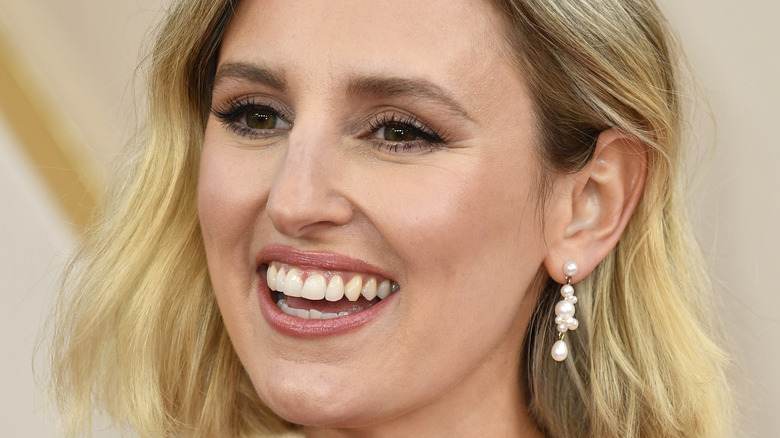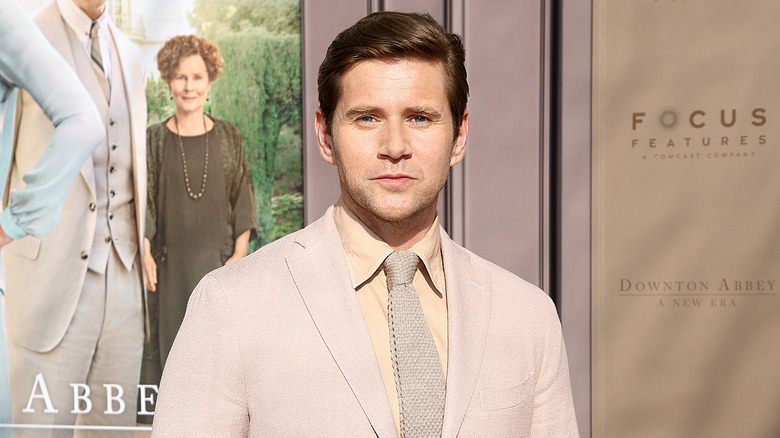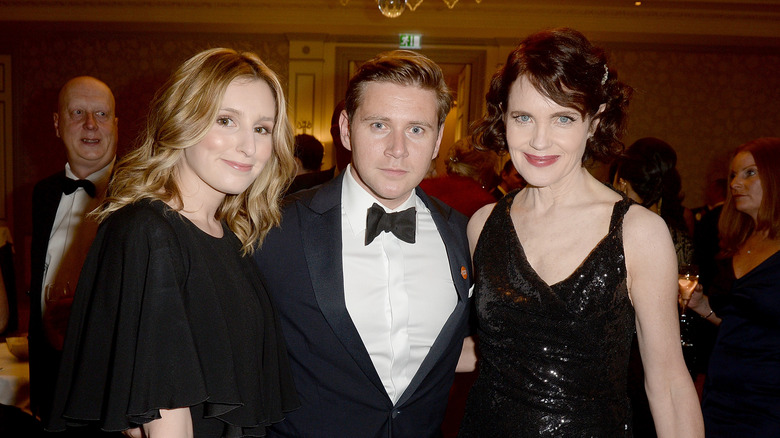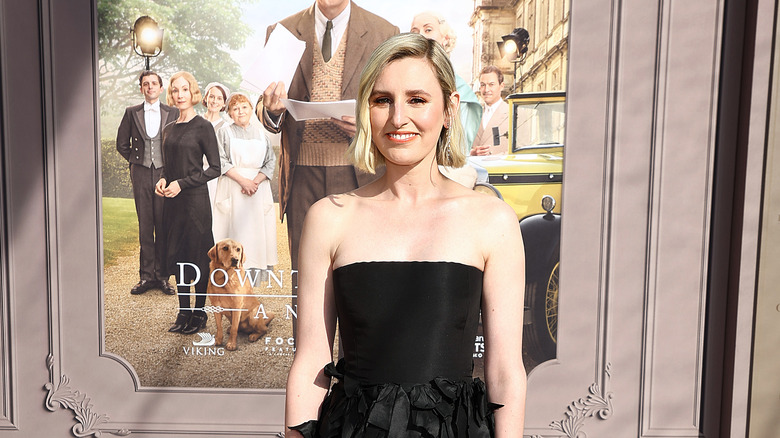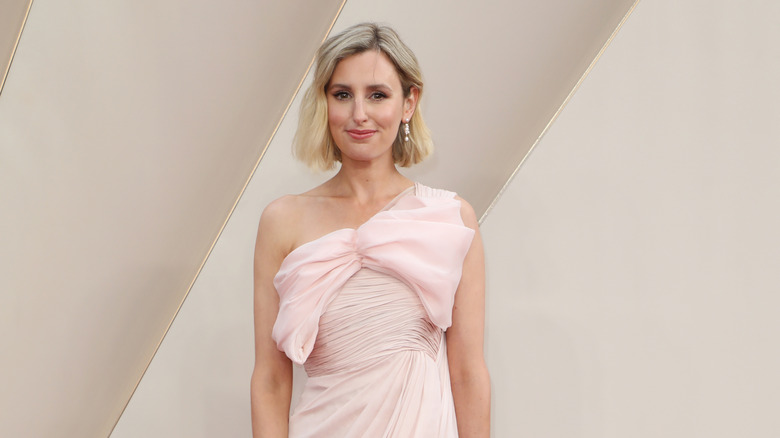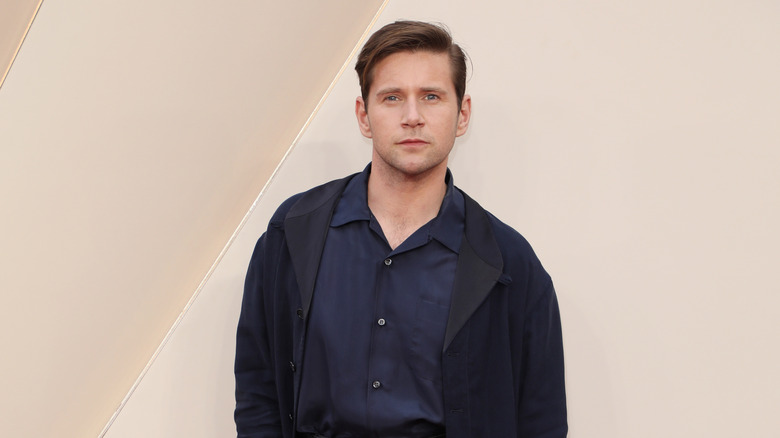Laura Carmichael And Allen Leech On Downton Abbey: A New Era And More - Exclusive Interview
When we ponder the many television series that have truly made a mark on the British entertainment scene, few rival the impact and legacy of "Downton Abbey." The beloved show – which ran from 2010 to 2015 – brought a treasured array of characters to life, from the likes of Maggie Smith's matriarchal role, Violet Crawley, to the enduring staff and likes of Jim Carter's Charles Cranson. "Downton Abbey" set itself apart from the bulk of British television shows when its first feature film was released in 2019, bringing the same cast and characters to the big screen.
In a delightful move for fans near and far, the creative minds behind the series brought yet another full length film into the world, this time in the form of "Downton Abbey: A New Era." With so many plot points up in the air, character relationships left to the imagination, and fates unknown, "A New Era" could be the very film that "Downton Abbey" fans have been waiting for.
Ahead of the film's premiere on May 20, we sat down with two revered actors who bring Lady Edith and Tom Branson to life — Laura Carmichael and Allen Leech — for an exclusive interview, and dived head first into the "Downton Abbey" world and what the experience has been like for the two creatives. From a brief foray into the pleasures of the south of France to buttoning up the futures of their characters, Carmichael and Leech gave us unmatched insight into the world that so many of us have come to love.
Laura and Allen reflect on their initial reactions to the New Era script
You both look wonderful, I have to say first and foremost.
Allen Leech: We were actually just saying, I wish my skin were-
Laura Carmichael: There's some sort of filter on this set.
Leech: There's some magical thing happening. We're thinking if we have any auditions to do, we should keep this set up.
Carmichael: I want to keep borrowing that light.
I'm going to jump straight into questions ... I don't want to rapid fire on you both, but I'd love to dive into the complex emotions that your characters really experience and emote throughout this movie, in particular. Let's start with your initial reactions to the script. There were so many storylines up in the air when we revisit these characters. I'd love to know what that initial instinct and reaction was like when you first got the script in your hands.
Carmichael: Our initial reaction was, "Oh goody, we get to go to France." That was honestly my first thought. I was really pleased to see [Lady] Edith find her role again as a writer, and to see that she's still got that drive even when she's become a mother again. She's super happy in her marriage, but she still wants to work. I was really pleased to see that back in the story.
Leech: As a fan of the show myself, I was really... As you said, there were so many loose ends. I wanted to see what happened with [Mr.] Molesley, I wanted to see what happened to Tom [Branson], and to [Thomas] Barrow, so I was excited to read it. It feels like you're getting the first edition of something way in advance, so it's a bit of a privilege.
Laura and Allen revisited their roles with a new perspective
That initial character development that I often talk to actors about was set in stone for you both. You were revisiting roles that you'd fulfilled before. In what ways were your notions or understanding of these characters challenged by this new film, this new era, to throw that term in?
Leech: For Tom, his character journey throughout the show and then the first movie, he constantly is in this world that is at odds with his beliefs that he brought in at the very start.
In the movie, again, he is challenged because his daughter has been willed this magnificent palatial villa in the south of France, and yet he's struggling to find how that sits with any of his ideals or beliefs. That's the main struggle he has in this movie, trying to equate this life that he's a victim of circumstance in, and then lovely things happen and he even says that at one point. There's a world, just because of your blood, that lovely things happen to you in it, and he has to really try and figure out and justify how he's become one of these people where lovely things happen.
That presents a bit of an internal struggle as well, which certainly comes across on screen, as someone who's trying to find their footing, really.
Leech: Yeah, and in a way, finding happiness again and finding someone like Lucy [Branson] has given him the stability to then, maybe, begin to think like he used to again, because for a while, we felt that Tom was just trapped in this world because of his daughter and the fact that he couldn't go home.
Carmichael: As I said, I'm delighted that [writer Julian Fellowes] has picked up that side of Edith again where she's finding her voice. I always want more of that. That's always my thing with ego, because it felt like such a cool development throughout the show. To see her come back in that way in this movie was really satisfying for me.
Laura and Allen discuss the two major plot lines of the film
I love that, in the film, we have these two simultaneous storylines evolving: the villa, which is beautiful — I sat there in the theater wishing I could be on that property — and then the movie within the movie. [Could] both of you elaborate on the filming experience, because the storylines were quite divorced from one another until more towards the end of the film?
Carmichael: It's quite often a game of two classes, isn't it, at "Downton?"
Leech: Yeah.
Carmichael: With the upstairs and the downstairs, because of the location. The downstairs servant quarters were filmed in a studio, and we were at Highclere Castle, and then we had this extra layer, two or three weeks at the end, which is the cast that goes to France. That meant that it was –
Leech: It was more disjointed.
Carmichael: Yeah, but it was a thrill to see the film, to see the finished product. I wanted to see what they've been up to. I really enjoyed it.
Leech: What was wonderful was it opened up the world of "Downton," taking part of the cast abroad, and what Julian's very cleverly done as well, he's brought them from both the family and the servants. It's not just the family — you can experience exactly as you would back at "Downton."
I felt as well that this movie has, as you said, so many more plots and subplots. Julian's so brilliant at intertwining all of those stories, like you say, and they all come back together at the end.
Laura Carmichael ponders Edith's future off-screen
Laura, to turn to you and to Edith's story and development — I obviously have a soft spot of her background in journalism because that's what I do. You've touched on it a little bit, [but] how has Edith really come into her own, realizing her professional aspirations again? What [do you] you hope her future looks like off screen?
Carmichael: I would love for her to keep writing and keep being the boss. It was such a fun experience the last few seasons when she got to that space, and that was why Bertie fell in love with her. He fell in love with her as this career woman. It feels right that he would carry on supporting her, even though their lives have changed so much. You can definitely see her rocking it, and there are examples of these women, particularly these aristocratic women, that were pioneers in their way.
Allen Leech reflects on Tom's development over the series and film
Allen, I want to turn to you with some questions directed at Tom's journey throughout the film, but also in the series in a larger sense as well. We've watched him rise through the professional and personal ranks. We've seen him suffer. Now, in the film, as you said, his daughter's inheriting this amazing villa. In what ways [has] Tom's development over all these years surprised you and challenged you as an actor?
Leech: It's been lovely to play those scenes that Julian wrote because Tom had to stay, in a way — he had no choice. It's always been interesting, and I've always tried to hold onto that sense of who he was when he arrived. He had incredibly strong, and at the time, fairly radical political views. I've always tried to keep a sense of the fact that he was always for the common person, the common working man or woman. That's always been the joy of playing this character because he also has been the eyes of the audience, I feel, especially if you're outside of the UK and outside of an understanding of the social structure. A bit like Tom, you're looking at this thing and being like, "What's going on?" It does seem very, very strange.
I really tried to keep that sense of not giving up on who he was and not being completely enveloped in this world. At times, I even struggled with the line, "It looks like, Tom, you're a leopard who truly has changed his spots." They asked me to — in the script, it says, "and Tom laughs," and I didn't, because I don't think he will. He did and I don't think he is that person.
Carmichael: No.
Leech: He would say he's not, he's someone who's adapted, but he certainly hasn't changed who he is.
Focus Features will release "Downton Abbey: A New Era" in theaters on May 20, 2022.
This interview has been edited for clarity.
